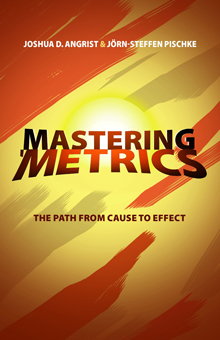Separate, Not Equal
If you want to produce good quantitative social-science research, remember two words: ceteris paribus.

By Joshua D. Angrist, professor of economics, and Jörn-Steffen Pischke
PRINCETON UNIVERSITY PRESS, 2014, $35
That’s Latin for “all other things being equal.” And it’s a key research principle: if you take two groups of people that are different in one key feature but equal in other ways, you may be able to identify the effects of that difference.
“People are constantly looking at the world around them and trying to learn from it, and that’s natural,” says economics professor Joshua Angrist. “But it turns out to be very difficult, because the world’s a complicated place, and many things are going on.”
Angrist, a leading advocate of social-science research that uses ceteris paribus principles, has now written a book on the subject called Mastering ’Metrics: The Path from Cause to Effect, published by Princeton University Press and coauthored by Jörn-Steffen Pischke of the London School of Economics.
Although randomized control trials are the best way for social scientists to do research, Angrist says they’re often thwarted from doing such research for reasons of practicality, cost, or ethics. “The best way to isolate cause and effect, and make sure you’ve only got one thing going on, is to do an experiment,” he said in an interview about the new book.
Since randomized control trials can be problematic when your subject matter is people, researchers instead hunt for existing situations where otherwise equal groups of people have been placed in differing circumstances because of policy changes, geographical quirks, and more.
Angrist and Pischke detail various methods of identifying causal relationships in society. One way is to study social programs that have randomization built into them—one example being the lottery-based program that Oregon instituted to give Medicaid coverage to some citizens but not others. This allowed researchers to show, among other things, that when people have health insurance, they tend to get more medical care. But even without such randomization, scholars can locate “natural experiments” that create ceteris paribus conditions, shedding light on current policy matters or even historical questions.
Angrist, a labor economist, emphasizes that researchers still need hard-earned knowledge of a particular subject to construct good studies. Even that doesn’t guarantee airtight results: in the book, he discusses one study he and a colleague conducted about compulsory schooling and its relationship to earnings. The findings seemed strong until other researchers discovered that the results probably stemmed from long-term regional social and economic trends rather than a causal link between compulsory schooling laws, education, and earnings.
“There’s a lot more failure than success in empirical work,” Angrist acknowledges. Still, he adds of the book, “If we get [readers] to think clearly about statistics and causal relationships, then it will be a success.”
Recent Books From the MIT Community
Transient Workspaces: Technologies of Everyday Innovation in Zimbabwe
By Clapperton Chakanetsa Mavhunga, associate professor, Program in Science, Technology, and Society
MIT Press, 2014, $34
The Art of Insight in Science and Engineering: Mastering Complexity
By Sanjoy Mahajan, visiting associate professor of electrical engineering and computer science
MIT Press, 2014, $30
Do Fathers Matter? What Science Is Telling Us About the Parent We’ve Overlooked
By Paul Raeburn ’72, chief media critic, MIT’s Knight Science Journalism Tracker
Scientific American | FSG, 2014, $26
Saving American Manufacturing: The Fight for Jobs, Opportunity, and National Security
By William R. Killingsworth, SM ’68, PhD ’72
Business Expert Press, 2014, $43.95
The Sports Strategist: Developing Leaders for a High-Performance Industry
By Ben Shields, Sloan lecturer; Irving Rein; and Adam Grossman
Oxford University Press, 2014, $29.95
Leading Digital: Turning Technology into Business Transformation
By George Westerman, Sloan research scientist; Didier Bonnet; and Andrew McAfee, principal research scientist and associate director of Sloan
Harvard Business Review Press, 2014, $30
Introduction to Modern Cryptography (second edition)
By Jonathan Katz ’96 and Yehuda Lindell
CRC Press, 2014, $79.95
Refining Design for Business: Using Analytics, Marketing, and Technology to Inform Customer-Centric Design
By Michael Krypel ’02
Adobe Press, 2014, $44.99
Please submit titles of books and papers published in 2014 and 2015 to be considered for this column.
Contact MIT News
E-mail mitnews@technologyreview.com
Write MIT News, One Main Street, 13th Floor, Cambridge, MA 02142
Keep Reading
Most Popular
Large language models can do jaw-dropping things. But nobody knows exactly why.
And that's a problem. Figuring it out is one of the biggest scientific puzzles of our time and a crucial step towards controlling more powerful future models.
The problem with plug-in hybrids? Their drivers.
Plug-in hybrids are often sold as a transition to EVs, but new data from Europe shows we’re still underestimating the emissions they produce.
Google DeepMind’s new generative model makes Super Mario–like games from scratch
Genie learns how to control games by watching hours and hours of video. It could help train next-gen robots too.
How scientists traced a mysterious covid case back to six toilets
When wastewater surveillance turns into a hunt for a single infected individual, the ethics get tricky.
Stay connected
Get the latest updates from
MIT Technology Review
Discover special offers, top stories, upcoming events, and more.